Search the Special Collections and Archives Portal
Search Results
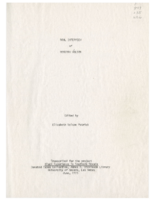
Transcript of interview with Woodrow Wilson by Gwendolyn Goodloe, February 28, 1975
Date
Archival Collection
Description
Interview with Woodrow Wilson conducted by Gwendolyn Goodloe on February 28, 1975. Wilson worked at the Basic Magnesium plant and became the first black elected to the Nevada Assembly in 1966. He served as president of the NAACP in 1951, and was a co-founder of Westside Federal Credit Union.
Text
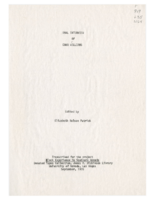
Transcript of interview with Cora Williams by Kathlyn E. Wilson, March 11, 1975
Date
Archival Collection
Description
Interview with Cora Williams conducted by Kathlyn E. Wilson on March 11, 1975. Born in Louisiana in 1930, Williams arrived in Las Vegas in 1952. She began working as a hotel maid and later owned a beauty shop. Williams discusses the NAACP and housing discrimination.
Text
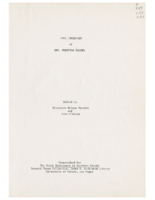
Transcript of interview with Rev. Prentiss Walker by Bernard Timberg, January 27, 1974
Date
Archival Collection
Description
Interview with Rev. Prentiss Walker conducted by Bernard Timberg on January 27, 1974. Born on an Oklahoma Indian Reservation in 1910, Walker arrived in Las Vegas in 1933 in hopes of working on Hoover Dam construction. After working in various jobs, he became ordained as a Baptist minister. Walker discusses job discrimination and living "uptown."
Text
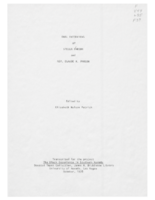
Transcript of interview with Stella Parson and Reverend Claude H. Parson by Maurice R. Page, February 26, 1977
Date
Archival Collection
Description
Interview with Stella Parson and Reverend Claude H. Parson conducted by Maurice R. Page on February 26, 1977. Stella came as a child to Las Vegas in 1942, while Claude arrived in 1952 at Nellis Air Force Base. As educators, the Parsons discuss the integration of schools in Las Vegas.
Text
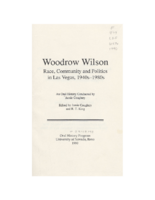
Transcript of interview with Woodrow Wilson by Jamie Coughtry, 1989
Date
Description
Interview with Woodrow Wilson conducted by Jamie Coughtry in 1989. Born in a Mississippi sawmill town in 1915 to a family that ran a boarding house, Wilson completed high school at a private boarding school and attended two years of junior college before the declining economy forced him into the Civilian Conservation Corps to work as a cook and baker. Migrating west in 1940, Wilson soon settled in Las Vegas, Nevada, where he worked for Basic Magnesium, Inc. He became a prominent Westside community activist, founding a federal credit union and serving as president of the Las Vegas NAACP. Wilson worked for over thirty years as a warehouseman for companies that occupied the Basic Magnesium site. In 1966, he was elected to the state assembly, becoming the first black legislator in the history of Nevada, advocating open housing legislation, anti-discrimination regulations, welfare reform, and civil rights.
Text
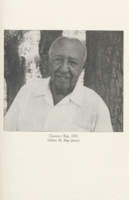
Transcript of interview with Clarence Ray by Jamie Coughtry, 1991
Date
Description
Interview with Clarence Ray conducted by Jaime Coughtry in 1991. Having arrived in Las Vegas in the 1920s, Ray provides a rare perspective on shifts in race relations over the years. He shares stories of early businesses and efforts at organization within the black community. From his arrival, Ray worked to secure equal opportunity and civil rights legislation. During the 1960s, he served two terms as president of the Voters League, formed in 1928 to increase black voting power.
Text
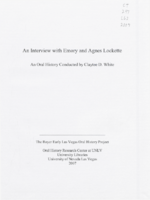
Transcript of interview with Emory and Agnes Lockette by Claytee D. White, March 11, 2005
Date
Archival Collection
Description
Interview with Emory and Agnes Lockette conducted by Claytee D. White on March 11, 2005. The Lockettes were the only African Americans to live in Boulder City during years of racial tension. Agnes taught kindergarten at Westside School, while Emory worked for the Bureau of Reclamation.
Text
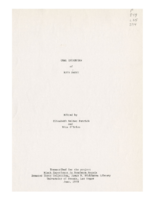
Transcript of interview with Ruth Sweet by Bennie Baucham, February 7, 1977
Date
Archival Collection
Description
Interview with Ruth Sweet conducted by Bennie Baucham on February 7, 1977. A native Nevadan born in the 1930s, Sweet worked for the State of Nevada, Division of Health. She discusses racism, public affairs, and government issues particular to Nevada.
Text
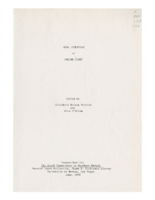
Transcript of interview with Arlone Scott by Glen Ette Davis, July 3, 1975
Date
Archival Collection
Description
Interview with Arlone Scott conducted by Glen Ette Davis on July 3, 1975. Born in Louisiana, Scott moved to Las Vegas in 1951, eventually becoming a hotel maid supervisor. She shares her early experiences of positive race relations among churches in Las Vegas and notes that the Culinary Union improved job opportunities for minorities. Scott concludes with comments on the effects of discrimination and segregation on entertainment and recreation for blacks.
Text
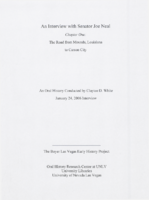
Transcript of first interview with Senator Joe Neal by Claytee D. White, January 24, 2006
Date
Archival Collection
Description
First interview in a series of five with Nevada State Senator Joe Neal conducted by Claytee D. White on January 24, 2006. Born in Mounds, Louisiana, in 1935, Neal joined his family in Las Vegas as a young man shortly before serving in the United States Air Force from 1954 to 1958. Following his military service, he earned a bachelor's degree in political science at Southern University in Baton Rouge, Louisiana. Neal continued his education at the Institute of Applied Science in Chicago, Illinois, with postgraduate work in law. From 1973 to 2001, he served in the Nevada Legislature as the Senator from Clark County Senatorial District No. 4. In the first interview, Neal recalls his childhood, moving to Las Vegas as a teenager, and joining the Air Force. He discusses his early experiences in politics and his involvement in various issues.
Text
